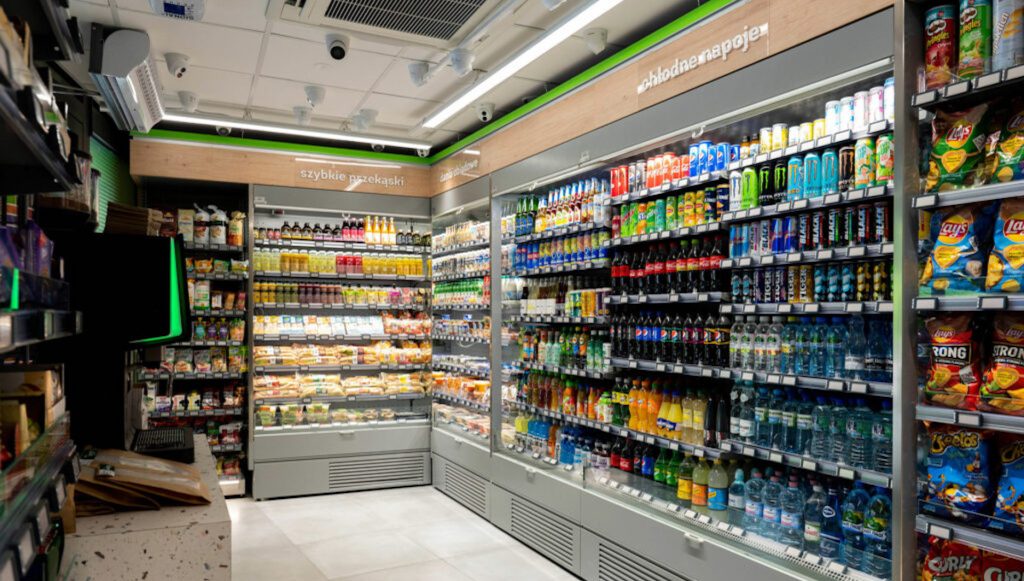Contactless stores are gaining traction, more so in Europe, but there are some trickling into the U.S., including Atlanta’s Nourish + Bloom Market that opened in January. In that article, we pointed out that the store was entering territory that included Amazon Go, 7-Eleven and Walmart.
Behind some of that cashierless technology are startup companies like Sensei, Standard Cognition, Zippin, Grabango and Trigo, which all recently took in venture capital to advance their approaches.
The latest company with an injection of VC is AiFi, which enables retailers to deploy and scale autonomous shopping cost-effectively. It does this in grocery stores, sport stadiums and convenience stores via a camera-only resource that does not require weighted shelves, significantly decreasing the cost and time it takes to get up-and-running, co-founder and CEO Steve Gu said.
In addition, its advanced tracking algorithms work in up to 10,000 square feet of space to support various shopping methods, including an app, credit card, gated or hybrid entry.
Santa Clara-based AiFi raised $65 million in Series B funding with participation from retail partners Aldi, Zabka and Verizon Ventures, which is enabling the company to utilize 5G technology.
AiFi emerges from stealth with its own take on cashier-free retail, similar to Amazon Go
This round gives the company a total of $80 million in funding and comes four years after we reported on AiFi emerging from stealth and two years after it took in what Gu had called its “pre-Series B.”
He intends to use the new funding to strengthen the company’s deployment team in order to launch stores faster and more efficiently. On that front, Gu believes AiFi has cracked the formula: in 2020, it would take six months to get a store ready to accept customers, and the company is now able to reduce that to less than one week.
In addition, AiFi will invest in product development and feature enhancement.
“Autonomous checkout is just the beginning,” he said. “From the data we are getting, people are starting to see the way you manage an autonomous store is similar to an e-commerce website.”
The capital infusion comes at a time when AiFi is experiencing growth. Two years ago, the company had no public-facing stores, and now it has 40 stores, including 30 with Zabka. Back then its largest store was 3,000 square feet, and in January, it launched a 6,000-square-foot Aldi store in London.
Last November, AiFi went live in Paris with a first-of-its-kind, 10/10 Flash concept store with Carrefour. It expanded to National Football League stadiums and music festivals, where stores have reduced average transaction and queue time by 50% and increased per capita sales by 170%.
In addition to Aldi, Carrefour and Zabka, which Gu pointed out currently has the highest number of autonomous stores around the world powered by computer vision, AiFi is also working with Compass Group to open Market x Flutter, Ireland’s first completely frictionless store.
All of that movement has resulted in revenue growth of five to six times year over year, and the need for AiFi to increase its headcount from 40 employees in 2020 to 115 people all over the world today.
Meanwhile, Gu mentioned the global pandemic was a factor in helping retailers and consumers realize the importance of autonomous stores. On the retail side, it was also a benefit, as stores struggled to hire people.
Labor shortages resulting from the “The Great Resignation” was actually the second wave that hurt retailers, the first being people not going into stores because they didn’t want to touch things in the store, Melody Brue, retail technology analyst at Moor Insights, said.
She concurs with AiFi’s data from pilot phases of stores reducing checkout time and increasing purchase volume. In addition, it enables smaller stores to keep more accurate inventory that results in better management of the supply chain.
“We are getting so much data about how a customer shops, in what parts of the store people buy more and what products sell the best,” Brue said. “There is a lot of intelligence from this type of shopping that would take longer for a typical store manager to gather. If chips are selling better in aisle two than aisle four, that might be harder to recognize.”
With regard to continued funding into the autonomous retail space, it still seems to be flowing, as evidenced by AiFi and some additional companies, including French convenience store startup Boxy, which announced $28 million in funding a few weeks ago, and Focal Systems, which works with retailers like Walmart. In December, it raised $25.8 million for its retail automation.
“We’ve definitely seen big investments into automation, artificial intelligence and retail, and in some ways, it had a fintech element to it,” Brue said. “It looks like there has been a little bit of a dip-in-and-wait, for example, AiFi’s initial funding was a small round, and now it is getting a much bigger tranche. Venture capital investment over the past couple of years has been thematic in that way of investing in areas that add convenience and efficiency into people’s lives, and from a financial and retail perspective, that is getting a lot of traction.”































Comment